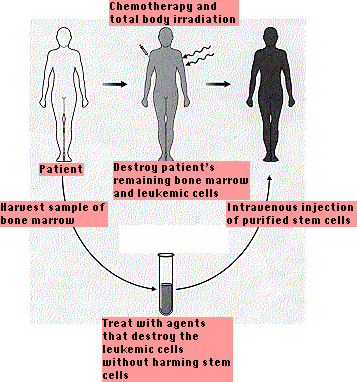They reside in the bone marrow and often bone marrow is harvested to secure them. However, a few infusions of granulocyte colony-stimulating factor (G-CSF) — available thanks to recombinant DNA technology — causes them to be released into the blood where they can more easily be collected.
They are increasingly being used to treat:High doses of chemotherapy and radiation can be used to kill off the cancerous cells in a patient, but they also destroy the patient's bone marrow, and the patient will die without a transplant of hematopoietic stem cells.

These can be:
| If the patient's own marrow was not completely destroyed, the donor lymphocytes and the patient's lymphocytes can exist together. Then a later infusion of the donor's T cells may be able to kill off all the patient's remaining malignant cells leaving the patient with a bone marrow that produces donor-type cells exclusively. [Link to further discussion] |
So hematopoietic stem cell transplants (HSCT) can be life-saving but create their own problems. (Another example: an "immediate"-type allergy like hay fever or asthma of the donor can create the same allergy in the recipient.)
| Link to a discussion of other types of organ transplants |
| Welcome&Next Search |